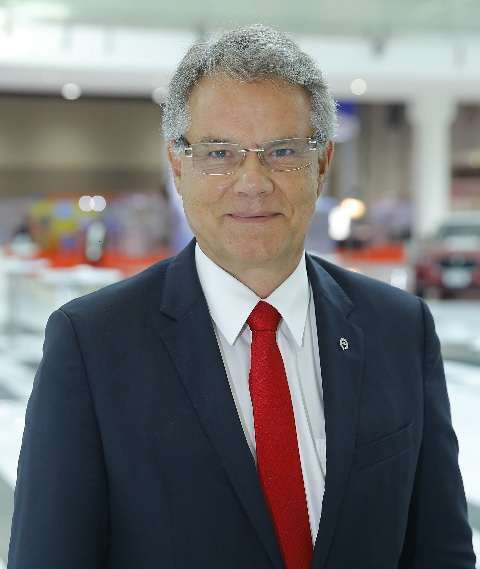
President of the International Pharmaceutical Federation (FIP), Mr Dominique Jordan, has urged pharmacists across the globe to strive to make impressive contributions in the healthcare space by making huge impact in primary healthcare.
Jordan made this disclosure to Pharmanews in an exclusive interview on the outcome of the recently concluded 80th FIP World Congress of Pharmacy and Pharmaceutical Sciences, held in Serville, Spain. He added that, towards the realisation of this goal, the Federation has been building on three key areas of work, which are non-communicable diseases, prevention and patient safety.
Emphasising the crucial roles of primary healthcare in any healthcare delivery system, Jordan noted that no healthcare sector can survive without a solid channel in reaching the grassroots.
He said this is the reason the federation has been specifically committed to primary healthcare for the past four years, stressing that activities are in top gear towards celebrating the fourth anniversary of this commitment with a Global Summit.
Speaking on other roles pharmacists can play in primary healthcare, aside from vaccination, he mentioned screening of people for increased risk of cardiovascular disease, as done in Australia; Prevention of HIV infections by prescribing antiretrovirals for pre- and post-exposure prophylaxis, as done in Brazil; improving tuberculosis patients’ health and helping stop the spread of the disease, as done in India; management of diabetes patients, as done in Lebanon; and detection of people at risk of colorectal cancer and screening, as done by Switzerland community pharmacists, among others.
Below is the full text of the interview:
Congratulations on the successful conclusion of the 80th FIP World Congress of Pharmacy and Pharmaceutical Sciences, held in Servile, Spain. Can you mention some of the takeaways for pharmacists from this year’s congress?
After a long wait for this FIP World Congress in Seville to become a reality, finally, we were able to gather. The congress was not only a sign that we are emerging from the COVID pandemic, but was yet another strong demonstration of pharmacists’ dedication to healthcare everywhere.
During the congress, colleagues from 104 countries discussed learnings for future preparedness. We shared the evidence supporting the response to COVID-19 and heard from experts on a range of topics, including new medicines, improving communication and addressing misinformation, as well as strategies to support whole-person healthcare.
We shared our ethical challenges and explored solutions to health inequities, medicines shortages, choices and affordability, sustainability, and technological advances, among other subjects. New knowledge in these areas was taken home by our participants to put to use to benefit our societies.
We are very proud of the success of this congress and the even stronger relationships we have built. I am confident that our collaboration will remain strong as together we advance our profession. The congress also reminded us of the importance of meeting face to face, and of the engagement this facilitates.
Now, it is time to look forward to our next congress and beyond the topic of healthcare recovery. Our 81st World Congress of Pharmacy and Pharmaceutical Sciences will take place 24-28 September 2023 in Brisbane, Australia, under the theme of building a sustainable future for healthcare. Our actions, our services, our rightful place in healthcare systems must be sustainable and I urge all colleagues to join us in our work to make this happen.
In line with the theme of 2022 World Pharmacists Day, what is FIP’s mandate to pharmacists across the globe?
World Pharmacists Day 2022 was the 12th global celebration of our profession, led by FIP. The theme was “Pharmacy United in Action for a Healthier World” and, without a doubt, our profession showed its unity on that day, with this message being carried in at least 140 countries through numerous and varied activities.
Our profession came together to make sure everyone knows how committed pharmacists, pharmaceutical scientists and pharmacy educators are to making our world a healthier place. Colleagues from every sector — including community, hospital, industry, science, education, research and clinical trials, government, regulation and non-governmental organisations — showed their pride in our profession and celebrated our contributions to the targets of Sustainable Development Goal 3, health and well-being for all.
We saw the value of pharmacy talked about in national newspapers and on the radio. We heard #WPD2022 messages from health ministers and health systems recognising our profession’s contribution. Pharmaceutical companies, wholesalers, other corporates in the health sector and even financial institutions also took the opportunity to thank pharmacists for their efforts to make medicines expertise and healthcare accessible to all.
We have successfully shown how our profession is united for a healthier world, regardless of and overcoming conflict, different politics and cultures, and economic disparity. I would personally like to thank all our member organisations and individuals who have supported the campaign this year. I feel so proud to be a pharmacist and to be the president of FIP.
I encourage everyone to take part in the campaign next year, on 25 September, to promote our great profession even further. The theme for WPD2023 will be announced at the end of March and I invite colleagues to keep an eye on FIP social media for news.
At the congress, much was said about expanding pharmaceutical services to vaccination centres, and point-of-care centres. How can this be achieved without pharmaceutical premises being seen as a rival to a hospital?
The COVID-19 pandemic has clearly demonstrated that there is both room and need for vaccination and testing in pharmacies, and that this is essential if we are to be able to offer access to health to as many people as possible. When, during the pandemic, access to many healthcare facilities were restricted, pharmacies remained open to provide care. Prevention is better than cure and vaccination is the second most effective public health intervention after clean water.
As the global leader of Pharmacy, we have continued to advocate for expansion of vaccination by pharmacists. We are pleased that the number of countries with pharmacists as vaccinators has increased. According to our data, as of August 2022, pharmacy-based vaccination is now available in at least 40 countries and territories — 20 more than in 2016.
Throughout the pandemic, FIP has been gathering evidence of actions and outcomes and we now have good evidence to share, reflect on, and use to transform Pharmacy globally, so that we are fully equipped to contribute to the present and future challenges of our health systems.
We should not be looking upon other types of healthcare facility as rivals. The wording of FIP’s vision is clear: A world where everyone benefits from access to safe, effective, quality and affordable medicines and health technologies, as well as from pharmaceutical care services provided by pharmacists, in collaboration with other healthcare professionals. There is a role for everyone to play in the service of our societies. I think the pandemic has opened up many doors for pharmacy and helped others to view our contributions positively.
How would you address the challenge of inadequate funding and facilities in the production of medicines in some parts of the world, especially the developing countries?
Inadequate funding and facilities are indeed a complex challenge that we must overcome. It is not right that we have some parts of the world with good facilities but others not, and this is what the concept of universal health care aims to correct. It has helped, to some extent, that the COVID pandemic has made our vulnerabilities in terms of access to medicines, for example, clear and it has been encouraging to see developments such as the push for Africa to make its own medicines.
FIP and its partners, under the World Health Professions Alliance, have been advocating for more investment in healthcare and will continue to do so. Where possible, FIP also advocates improvements in related areas. Earlier this year, for example, we met with energy suppliers to raise awareness and discuss solutions to energy supply challenges across Africa, in order to help prevent the devastating outcomes of outages on the provision of healthcare.
But more developments are needed in this area and this requires political will, as well as investment. We believe that our health ministers’ summit next year will provide an opportunity to garner more support.
Regarding the migration of pharmacists to other professions, what is FIP admonition to other pharmacists?
It would not be right for me to tell colleagues in which direction to steer their careers. What I can say is that Pharmacy is a great profession that allows you to help others with the most valuable commodity that we have — health. A qualification in Pharmacy will serve you well in many sectors and can take you to many new places, but the world definitely needs pharmacists now more than ever. Let me add that I have been a pharmacist for over 34 years and remain so. I am proud to be a pharmacist and I hope others are equally proud to be pharmacists!













